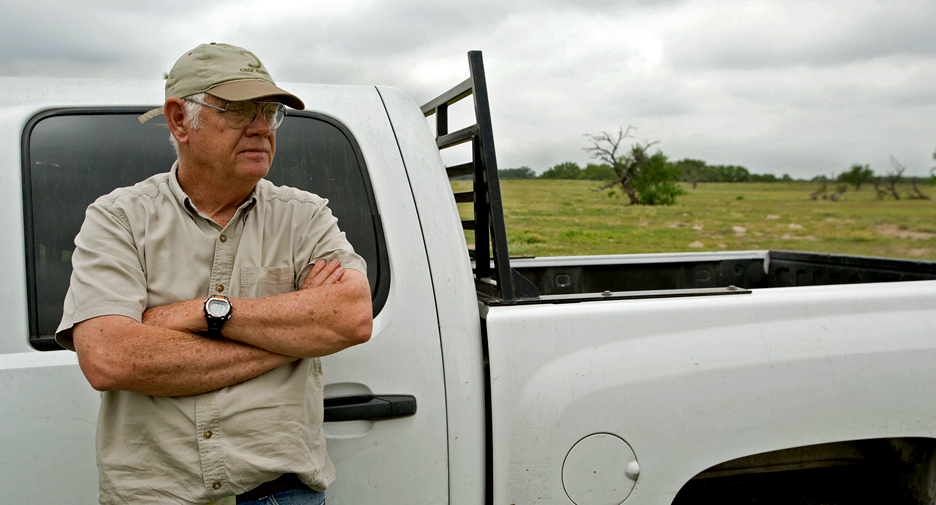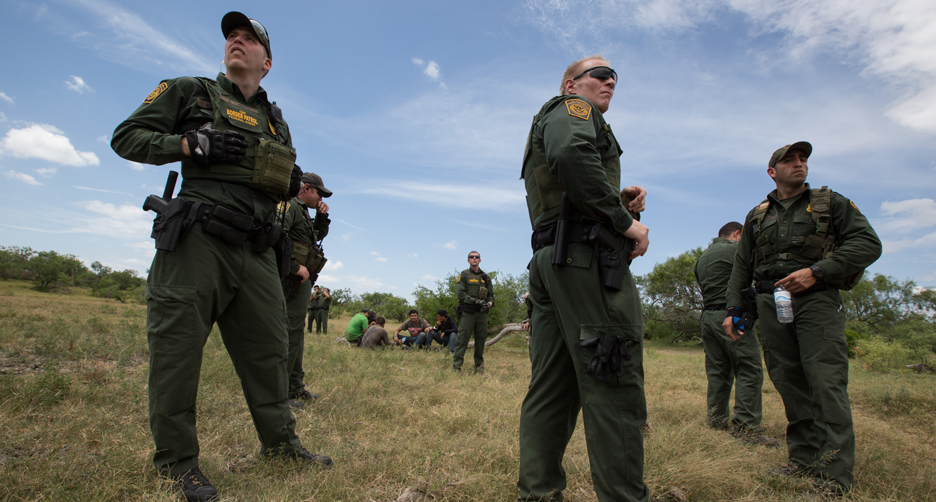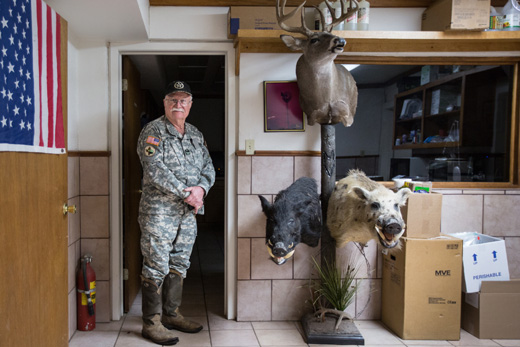Presnall Cage was driving the outskirts of his ranch when he saw the black tennis shoes. The sight of them up ahead, neatly arranged in a rut of the sandy road, filled him with dread. Several vultures perched in a sprawling live oak tree near the road, and two more flew in lazy circles. He already knew what he would find underneath the tree.
This time it was a young man — what was left of him — his body already decomposing in the heat. In his pockets were US credit cards and an ID. It was always a sad thing to witness, yet another life lost on his land. Like hundreds of others in the past decade, the man had died in Brooks County, Texas, trying to circumvent an immigration checkpoint two miles south of Cage’s ranch. He called the sheriff’s department. By now he had the phone number memorized.
Not counting his time in the air force, Cage has, like his father before him and his grandfather before that, lived his entire life on his family’s sprawling south Texas ranch. He’s seen migration through his land ebb and flow, but he’s never seen so much desperate humanity coming through as in the past few years.
Like many ranchers in Brooks County, Cage’s political views are conservative, and he takes a hard-line stance on immigration. “The illegals broke the law when they decided to come here,” he says. “But the politicians can’t be honest about it.”
Cage believes the Obama administration is allowing the current influx of unaccompanied children and families from Central America to come across the border to help the Democratic party. “They need new recruits who will vote Democratic,” he says. But while his feelings about illegal immigration frustrate and even anger him at times, when he encounters people on his ranch who need help, he can’t help but feel sympathy for them.

Rancher Presnall Cage has come across numerous migrants on his land in need of help.Image: Jen Reel/Texas Observer
“Last Thanksgiving, we had a very pregnant woman knock on my daughter-in-law’s door. She’d been left behind by the smuggler,” Cage says. “We helped another woman – all she had was a T-shirt wrapped around her like a skirt. She’d been raped in the brush. And we had a baby born on the ranch. When you see a pregnant woman or a lost 14-year-old, your first instinct is to help. I may be a conservative, but I’m a human being, too.”
Most of the people who knock on his door these days come from Central America, a significant change from just five years ago, when 90% of the migrants passing through south Texas were from Mexico, according to Border Patrol apprehension figures. In 2012, US government data showed that for the first time in 40 years, net migration from Mexico had reached zero. But apprehensions of Central Americans coming across the south Texas border have tripled since 2011. The southernmost tip of the Texas-Mexico border is the shortest distance from Central America to the United States and the most traveled route.
Very few of the migrants come through his land without a guide, Cage says. Everyone must pay the cartels and organized crime at some point to make the journey. Most tell Cage they’ve paid anywhere from $7,000 to $9,000 to get to Houston from Central America. “They think the lights of Falfurrias are Houston,” he says. “That’s what the guides tell them – that they’ll only have to walk a couple of hours to get to Houston. When I tell them it’s a four-hour drive they get very disappointed.”
It’s been tough to adjust to the influx, he says, and hard not to feel resentment. In Texas, private property rights are sacrosanct, and they are fiercely protected in Brooks County, where nearly all the land is privately owned. What Cage wants most is a return to the days when people didn’t routinely venture across his land, he says. Ranchers covet their quiet way of life, governed by a set of rules they call “ranch etiquette,” he says. “You don’t ask a man how many acres he owns because it’s like asking to look at his bank account. You don’t enter someone’s land without asking permission first.” That way of life is slipping away.
- “That's the squeeze point,” Cage says. “The McAllen ranch south of here doesn't have the same problems we do.”
It’s not just the trespassing migrants who are exerting pressure on traditional ranch life. Now many of Cage’s neighbors are absentee landowners – hedge fund managers or oil and gas millionaires who live in Houston or California. Cage is one of the last members of the old ranching families in Brooks County still living and working on his own land. “Women don’t want to live out here,” he says. “And it’s a tough place to raise your kids.” His children, now grown, have moved to Dallas and San Antonio. But Cage won’t leave, he says. “I love every acre.”
Every morning, Cage steers his white Chevy truck around the ranch, taking stock of what needs to be repaired or replaced. He employs a dozen cowboys and ranch hands to help him. “I keep things in pretty neat shape,” he says. When he was young, he remembers, hardy men from Mexico walking alone or in pairs would stop at the ranch to ask for work and a place to stay. “We would give them work and they’d live at the ranch. It wasn’t illegal back then to hire them,” he says. “They worked hard.” These days, Cage says, he doesn’t hire anyone who isn’t a US citizen, and it’s a struggle to find workers he can rely on. “We’re almost always looking for someone. It’s tough to find anyone who isn’t on probation.”
In the springtime, his ranch is verdant with cactus blooming with vibrant yellow flowers. Heart’s delight, a rich fuchsia-colored flower that grows only in this region, dots the green pastures where his cattle graze. Cage points to an old live oak tree, which he calls “Will’s tree,” after his youngest son. “He was 12, and we let him go out hunting by himself. But he got lost after tracking a deer and then the sun set. He couldn’t find his way back in the dark. We were worried sick about him all night and set up search parties. We found him in that tree there the next morning.” Cage laughs about it now. “He’d spent the whole night in that tree.”
Farther down the road is a small pond. A white egret poised on its stilt-like legs surveys the shallows. “This pond is named after my son Grady,” Cage says. It had always been his eldest son’s dream and his dream too that Grady take over the ranch when Cage retired. “That was the plan since he was little,” Cage says. But Grady died in 2012 at the age of 34, from cancer. “He fought it for 13 years,” he says, looking out at the pond.
After a moment he puts the truck in drive and heads toward a wire fence that marks his property’s boundary. A pink and black backpack hangs from the barbed wire at the top of the fence. Beneath it the wire is bent upward and the sand dug away where people have crawled underneath. “I’d say I spend about $20,000 a year repairing the damage that’s been done,” Cage says. “At least they didn’t cut the wire this time.”
Cage has had the flotation devices that trigger the water pumps for his cattle troughs ripped out by people looking for water, and sometimes migrants leave the gates open and cattle get lost. Then there are the hundreds of pounds of litter left behind every year on his ranch – everything from discarded water bottles and cans to backpacks, toothbrushes and cell phones. In the winter months, his cowboys do trash duty, scouring popular hiding places and migrant drop-off points for the detritus left behind.
- “I was five miles from nowhere on our property, and I'm in the middle of a raid.”
Cage blames the checkpoint for all of the traffic on his land. “That’s the squeeze point,” he says. “The McAllen ranch south of here doesn’t have the same problems we do.” The US government built the checkpoint without any consultation with local ranchers or townspeople, he says. In the next decade, the US government plans to double the checkpoint’s size from four to eight lanes and add several more agents.
But none of the growth will help Brooks County, or the town of Falfurrias, where most of the county’s 7,200 residents live. As the checkpoint expanded over the years, becoming the second busiest on the southern border for narcotic seizures and immigrant apprehensions, Falfurrias declined in population. Prospectors had struck oil and gas but, as in so many other Texas towns, the bounty flowed for only a couple of decades before becoming tapped out. The last of the town’s heyday was the 1960s. Now at least 40% of the population lives in poverty. “The town’s become pretty pathetic,” Cage says. When he was young, the town had five car dealerships, a hospital and two or three tractor dealerships, but now they’re all gone. In the past two decades, the number of Border Patrol agents stationed in Brooks County has grown from nine to more than 250, but it’s rare that any of them live in town. “Twenty years ago I knew every one of the agents,” Cage says. “Now I don’t know any of them, and none of them live here.”

A Border Patrol bust on Cage's ranch this June brought in seven large bales of marijuana. Five men were detained; two escaped.Image: Mae Ryan/The Guardian
Migrants aren’t the only traffic Cage sees on his ranch. “A few months ago we were building a fence and saw a bunch of dopers drop 250lbs of marijuana,” he says. Some of the drug smugglers are migrants coerced by the cartels into carrying backpacks of marijuana, while others are members of the Gulf Cartel, which runs the Mexican side of the border in that region. In the past, Cage says, the ranch had always felt like a refuge for his family. There was no need even for locked doors. But last Christmas he gave his wife, Stephanie, a pistol because she no longer felt safe on her daily walks. “I never carried a gun in my life,” she says. “But now I do. The other day I was walking the dogs on our private roadway and saw a Border Patrol helicopter flying overhead and suddenly a car came speeding toward me. I was five miles from nowhere on our property, and I’m in the middle of a raid.”

Dr. Mike Vickers, a rancher, heads a citizens' militia called the Texas Border Volunteers that patrols Brooks County to round up undocumented migrants and report them to Border Patrol.Image: Mae Ryan/The Guardian
Some ranchers have taken up arms. Dr Mike Vickers, a rancher and local veterinarian, formed a citizens’ militia in 2006. Called the Texas Border Volunteers, it patrols the county, rounding up undocumented migrants and handing them over to Border Patrol. Members of the group, which consists of ranchers, retired military and other volunteers from across the US wear military fatigues. They go out heavily armed. Cage hasn’t joined Vickers’ group, but he allows it to patrol his land.
A number of politicians have come to Brooks County for meetings and photo ops, especially since President Obama declared that the thousands of unaccompanied children coming across the border from Central America constitute a humanitarian crisis.
“They keep coming down to look at the situation but nothing here has changed,” he says. “I don’t really know what the solution is, but I would like to see it stop. I saw enough dead bodies fighting in Vietnam.”
What especially angers Cage and other landowners is a wrongful death lawsuit filed against a neighbor. In 2007, a security guard on the ranch stopped a carload of undocumented migrants being driven through the property to circumvent the checkpoint. The vehicle fled and was pursued by the security guard. The chase ended in a rollover, and a Mexican couple and their seven-year-old daughter died. Relatives of the deceased in Mexico filed the wrongful death suit against the landowner. The case reached the Texas supreme court, which recently sided with the landowner, a result that hasn’t calmed Cage’s fears. “The biggest fear I have these days is litigation,” he says. “Whether it’s warranted or not.”
Still, Cage doesn’t want outsiders to think that he and other ranchers are heartless. When he first started finding bodies more than a decade ago, he installed faucets along his water lines, marked with bright blue railroad ties so they can be spotted from a distance. Recently, he was approached by Eddie Canales, who opened the South Texas Human Rights Center in Falfurrias last year, about installing 55-gallon barrels filled with jugs of water on his ranch. Canales, a newcomer from Corpus Christi, 80 miles away, has had difficulty making inroads with local landowners, who are suspicious of an outsider. “You have to be careful about who you allow on your property, because it’s a liability,” Cage says. “You can get in trouble if you’re too sympathetic.” Even so, he’s allowed Canales to install two of the water stations on his land, which helped Canales gain credibility in the eyes of other landowners, so he could install more water stations and save lives.
Some days now it all feels like it’s too much to handle. “Pretty soon I’ll be 70,” Cage says, shaking his head. “I don’t know what I’m going to do. I’m getting too old to keep up the place.” But he says he’ll keep the ranch in the family somehow. “This is our life,” he says. “This is our home.”
Texas Observer staff writer Melissa del Bosque is a 2014-2015 Lannan reporting fellow with The Investigative Fund at The Nation Institute, now known as Type Investigations.